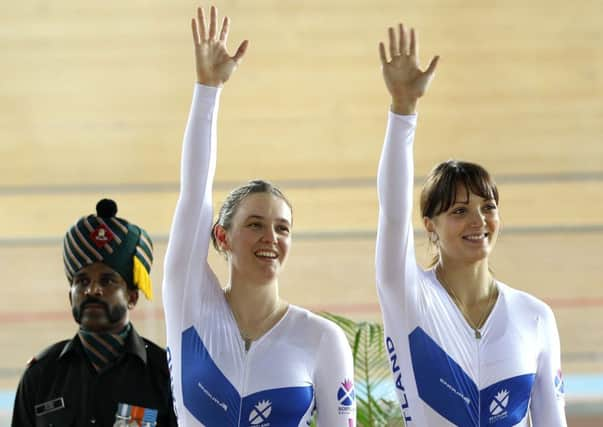Glasgow 2014: Charline Joiner repairing her dream


Charline Joiner has deep reserves of tenacity. It is one of the reasons she had a Commonwealth silver medal in her possession by the age of 21, and it is the single greatest reason she has not yet given up on adding to that collection in Glasgow, despite having been confronted by extreme adversity.
Lying overnight in a hospital bed in Girona, Spain, barely a week into the new year, Joiner was not worrying about her Commonwealth Games prospects because she was too busy trying to reassure herself that she would walk again.
Advertisement
Hide AdAdvertisement
Hide AdAfter the longest 24 hours of her life, some clarity came when a CAT scan finally provided a diagnosis of what damage had been done by her being flung over the handlebars and onto one another of the bikes being ridden in a training exercise. Joiner had suffered three fractures to the traverse processes that protect the muscles and ligaments pertaining to the vertebrae. In other words, she had broken her back, and she would have to learn to walk again before she could think about getting back on any bike.
Six-and-a-half weeks later – last Wednesday – she was back at the doctor’s for a progress check. Joiner being the tenacious type, she was disappointed to be told she should steer clear of the roads for a while yet. But, the advice went, she could return to training on the track, “as long as it’s in a controlled environment”, and that is what happened yesterday.
Less than two months after incurring three breaks to bones in her back, the Dunfermline woman was once more in the velodrome, relaunching her dreams, and all she had to do was be careful not to fall off her bike. After re-learning how to walk, an uncomplicated assignment surely.
“You are never going to try to fall, but I just need to be careful, instead of being kamikaze and head-first like usual,” she says of her prognosis, which permits her to go as fast as she likes on a training bike, but warns that the impact of a fall could lead to a revision of the 12-week recovery target.
“The doctor doesn’t want me to go on the road yet, too much of a risk of crashing, but maybe the first step will be going out on local roads close to home and just doing loops.”
As for the track, though, where she hopes to compete in the points race and scratch race come Games time, it appears nothing is going to hold her back. “I know that the London Revolution is coming up in three weeks, and I did ask: ‘Maybe I could go?’ The doctor said to maybe train as if I am going, and I think that’s a good idea. There is a possibility…”
When Joiner is not cycling, she is following rugby. Her brother is Craig Joiner, who won 25 caps for Scotland, and her boyfriend is Lee Jones, currently playing for Glasgow on the wing and expected to play Sevens at Ibrox this summer. She is familiar with the rough and tumble of contact sport, then, but neither her brother nor her beau can say he has experienced pain of the type that cycling has inflicted on petite Charline.
In the aftermath of her accident, she was denied painkillers and passed out. “I can’t even describe how painful it was,” she recalls, and the rehabilitation was more painful than painstaking, which might be perceived as merciful in some small way. “It was a case of sitting up on my own, then standing up on my own, then getting into bed on my own. It was little goals like that that really got me motivated. It was overwhelming in an emotional way every time I was able to do one of those things, because I was just so grateful.
Advertisement
Hide AdAdvertisement
Hide Ad“Learning to walk again took about a week, and the rehab process was quite painful, and everything new that I do to this day is quite sore, but the more I do it, the less it’s painful because it’s about getting the bone used to that muscle movement again.”
Joiner, who won silver in the team sprint alongside Jenny Davies in New Delhi, switched to endurance after finding herself shelved by the Scottish team in late 2011.
It seems that this is an athlete who uses adversity as a kind of propelling force. But when she really needed a change of luck to keep dark thoughts at bay, 2014 did start to be kinder to her.
When Jones secured a loan transfer from Edinburgh to Glasgow after a period of Sevens globetrotting, it meant that he would be able to be around more for his injured girlfriend and keep his own career upwardly mobile, too.
“He has been really supportive, and it’s nice for him at this time to be going through something positive as well,” she says. “If both of us had been in the shit, it would have been hard to pick each other up. But we’re both really positive and it’s nice to be looking forward to the same thing this summer. We both got letters about being baton-bearers on the same day.
“I just want it so much now,” she says. “I know everybody is training hard because it means everything to them, a home Games, but I’ve been through so much this year that it’s made me stronger and made me want it more.
“The funny thing is, people keep saying to me that I might actually be stronger for the Games because of what I’ve been through, because my body has had a rest.”
A broken back, a blessing in disguise? Sport gets curiouser and curiouser.